Coal Exports
Air Date: Week of March 29, 2013
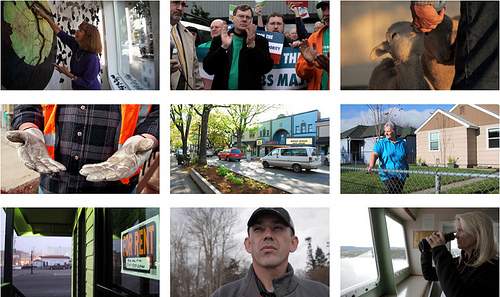
EarthFix's "Voices of Coal" project brings together diverse perspectives on the coal export debate in the Northwest. (photo: EarthFix)
U.S. Coal companies want to build export facilities in the Pacific Northwest to ship coal to Asia. But the governors of Washington and Oregon are urging the White House to consider the impact on climate change and taxpayers before approving the projects. Amelia Templeton of the public radio collaborative EarthFix talks to host Steve Curwood. Then local business owners Richard and Tanya Burkholder explain why they favor of exporting coal as part of the Voices of Coal project.
Transcript
CURWOOD: The governors of Oregon and Washington State are asking President Obama’s environmental team to weigh in on controversial plans to export coal from federal lands in Montana and Wyoming to markets in Asia. Governors John Kitzhaber of Oregon and Jay Inslee of Washington, both Democrats, have sent a letter to the White House, asking the government to consider costs to the climate and taxpayers as it reviews plans to build port facilities and rail lines.
Amelia Templeton from Oregon Public Broadcasting and the public radio collaborative EarthFix has been reporting on this story and joins us now to discuss the governors’ letter. Hi there, Amelia, how are you?
TEMPLETON: I'm good. How are you?
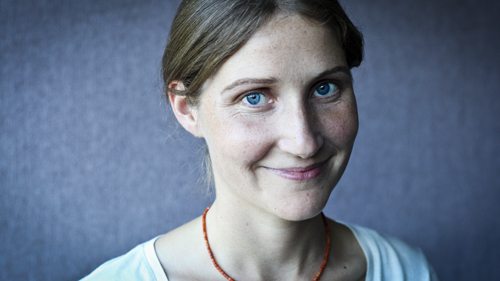
Amelia Templeton of Oregon Public Broadcasting (photo: Amelia Templeton)
CURWOOD: Glad to have you on the program! So to be clear, the governors of Washington state and Oregon are not asking to block the export of coal from federal land. They’re simply raising questions?
TEMPLETON: Yes, I think that's right. I mean, they're bluntly not in a position to block the export of coal from federal lands. But they're asking for: first, careful accounting of how much the government charges coal companies for the coal that we sell off of federal lands.
They’re asking for a clear accounting of the climate change consequences of choosing to export this coal and building the infrastructure that will make that happen. And they’re kind of warning the federal government. They essentially say these decisions will dwarf any other decisions we make regarding climate change, and it will be very difficult to credibly go to the international community and say that we are fighting climate change while continuing to make federal coal available this way.
CURWOOD: So the governors are saying that the resulting carbon dioxide, that is global warming emissions, from these coal exports would amount to some 240 million tons per year. How accurate do you think that assessment of some 240 million times a year might be?
TEMPLETON: It's a little hard to say. We put that question to an expert. He came up with about 175 million tons a year, so a little lower than the governors’ estimate. Greenpeace has come up with its own estimate - a little higher - 280 million tons a year.
But just to put all those numbers in perspective - that's greater than the total admissions of Oregon and Washington combined for a year. So they're all pretty big numbers. They’re all very significant emissions. And right now the Council on Environmental Quality recommends that any projects with greater direct emissions than 25,000 tons of carbon dioxide a year should be looked at for its climate impacts. So it’s about 1,000 times the threshold of what should trigger this kind of review.
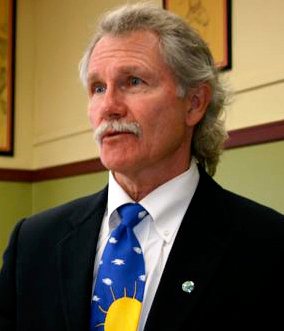
Governor John Kitzhaber of Oregon (photo: Orna Izakson)
CURWOOD: There’s a lot of talk about Keystone. Is this a bigger deal than Keystone do you think?
TEMPLETON: Some environmental groups are now coming out and saying this is a bigger deal than Keystone. I know Greenpeace has done some accounting and they have identified these proposals taken collectively as one of the greatest climate decisions that this country will make. So that’s certainly...Kitzhaber and Inslee aren’t the only people to have come to that conclusion.
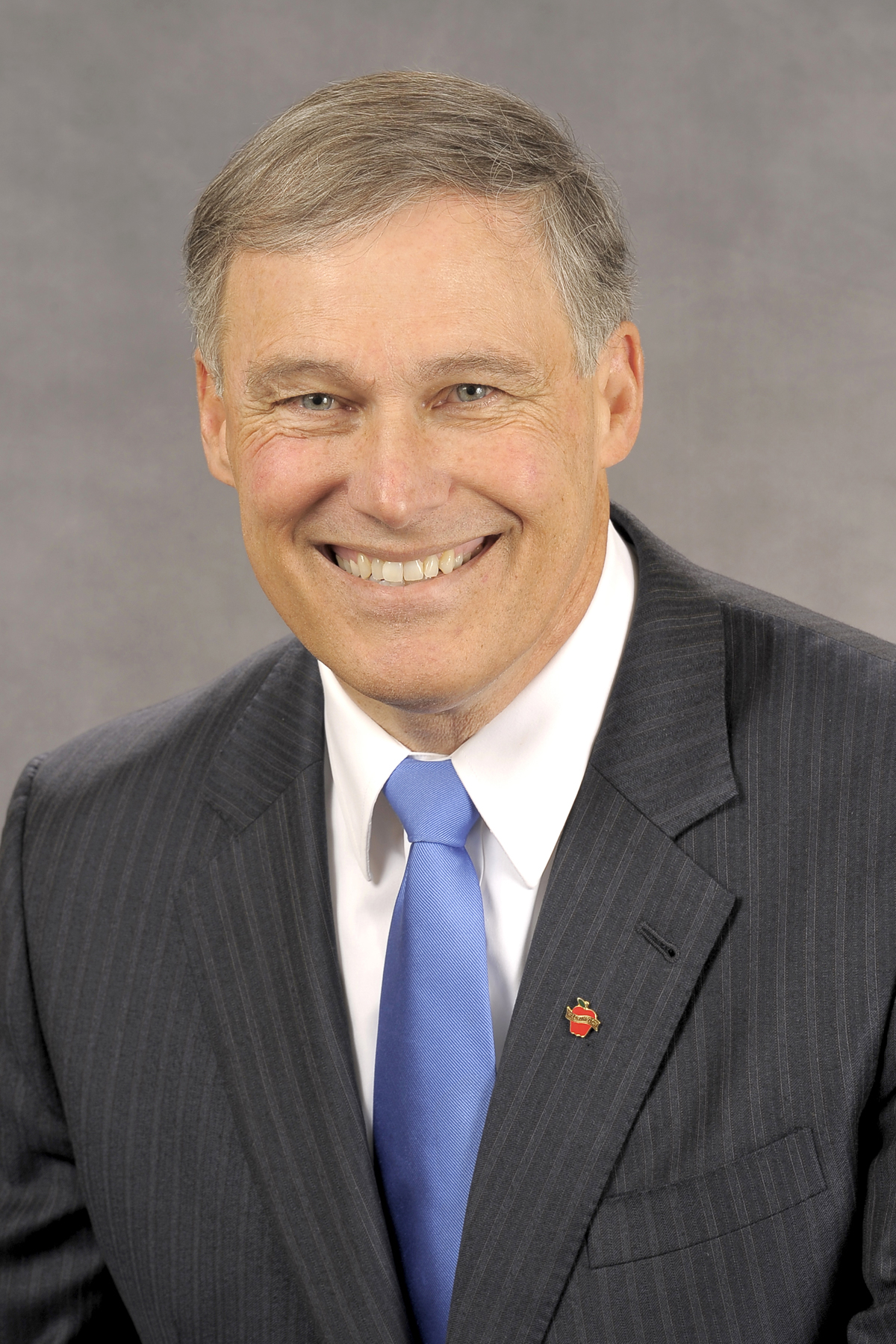
Governor Jay Inslee of Washington State (photo: the State of Washington)
CURWOOD: The letter claims that the way things are now structured, the US would actually be subsidizing the export of coal to Asia. Is that a fair assessment of what they're saying...and is that a fair assessment of the situation?
TEMPLETON: I think it’s definitely a fair assessment of what they're saying. The governors explain that the federal government owns some of the largest coal reserves in the world, and they allege that the federal government may be pricing that coal too low, and that if we do export that coal that will translate into a subsidy for coal-fired power generation in Asia.
CURWOOD: How much of an influence do you think the governors could have on these issues?
TEMPLETON: I don't know. I think what we've seen is they've been very influential in shining a light on the potential climate impacts of these terminals. And I think they’ve certainly been influential in encouraging debates. I'm not sure how how much influence they have over the ultimate permitting decisions that really rest of the Army Corps of Engineers and the federal government.
CURWOOD: How much do you think that this letter from these two governors reflects the concerns Washington and Oregon residents?
TEMPLETON: I think Washington and Oregon residents are certainly concerned about climate change and we have seen just in the last year some really massive forest and range fires that have a lot of people concerned. One prediction for our region is that changing climate may increase the size and frequency of wildfire.
We have major concerns with dams and water storage in the region that will be impacted by climate change. On the flip side though, polls have shown pretty significant support for these coal export proposals and pretty significant support on the basis of the jobs they’ll create and the economic activity they’ll bring to our region.
CURWOOD: Amelia Templeton is a journalist with Oregon Public Broadcasting and the Public Radio Collaborative EarthFix. She’s based in Medford, Oregon. Thank you so much, Amelia, for taking this time.
TEMPLETON: Thank you.
CURWOOD: EarthFix has been gathering public opinions on both sides of the fierce debate about the export plans for their Voices of Coal project. Here are a couple of those voices.
BURKHOLDER 1: I'm Richard Burkholder and I'm one of the owners at SpinReal Dunebuggy.
BURKHOLDER 2: Hi, my name is Tanya Burkholder. I’m also an owner at SpinReal Dunebuggy in North Bend, Oregon, just south of Lakeside. Our house is right here next to our business and the train tracks run probably 100 feet maybe behind our house. So we hear the train...
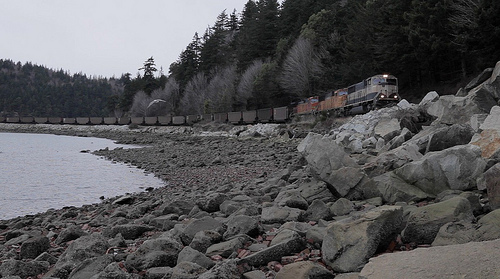
A coal train travels along Puget Sound en route to an existing coal export terminal near Vancouver, B.C. There are now 5 coal export terminals under consideration in Washington and Oregon to move coal from the Powder River Basin to Asia. (photo: Katie Campbell/EarthFix))
[TRAIN COMING DOWN TRACKS]
BURKHOLDER 1: They’ve always had a commercial type of train come through, whether it’s logging or it’s gravel, dirt. With the coal train coming through that they’re wanting to do, it’s just another product.
We have over 60 miles of these dunes along the coast. We have a wide variety of wildlife. There’s residential areas, there’s play areas. They train Iditarod dogs here, they do all types of stuff in the dunes. A coal terminal is not going to affect tourism.
We’re still going to see the business, we’re going to see the people coming through. It’s not in a position where we’re going to hurt the dunes. It’s not in a position where I believe it’s going to hurt the environment. It will impact our business as far as if the community grows, and economically it’s strong and sound. More people are going to come in here.
BURKHOLDER 2: It's a tourism driven community really. I think it would be nice to have an additional revenue booster in this area. I am from Montrose, which is in western Colorado right the middle of a lot of coal. A lot! To me growing up there it was just a part of life. There was a lot of people that my family knew that had jobs that were related to the coal industry. I saw coal trains a lot, but I really don't think there's a lot of negative about it. I think there's probably more positive. And I think that having it here would be a positive thing for this community.
BURKHOLDER 1: The terminal is going to provide jobs. It’ll bring in ships. It brings in sailors on those ships who spend money in town. They walk the boardwalk. They go to the restaurants. You drive down through Coos Bay right now. Look at how many buildings are empty. Look at how many businesses that used to be there are empty. With a coal terminal, put aside the coal. It’s business.
CURWOOD: Richard and Tonya Burkholder from Earth Fix’s Voices of Coal project. There’s a link our website, LOE.org.
Links
Living on Earth wants to hear from you!
Living on Earth
62 Calef Highway, Suite 212
Lee, NH 03861
Telephone: 617-287-4121
E-mail: comments@loe.org
Newsletter [Click here]
Donate to Living on Earth!
Living on Earth is an independent media program and relies entirely on contributions from listeners and institutions supporting public service. Please donate now to preserve an independent environmental voice.
NewsletterLiving on Earth offers a weekly delivery of the show's rundown to your mailbox. Sign up for our newsletter today!
 Sailors For The Sea: Be the change you want to sea.
Sailors For The Sea: Be the change you want to sea.
 The Grantham Foundation for the Protection of the Environment: Committed to protecting and improving the health of the global environment.
The Grantham Foundation for the Protection of the Environment: Committed to protecting and improving the health of the global environment.
 Contribute to Living on Earth and receive, as our gift to you, an archival print of one of Mark Seth Lender's extraordinary wildlife photographs. Follow the link to see Mark's current collection of photographs.
Contribute to Living on Earth and receive, as our gift to you, an archival print of one of Mark Seth Lender's extraordinary wildlife photographs. Follow the link to see Mark's current collection of photographs.
 Buy a signed copy of Mark Seth Lender's book Smeagull the Seagull & support Living on Earth
Buy a signed copy of Mark Seth Lender's book Smeagull the Seagull & support Living on Earth

